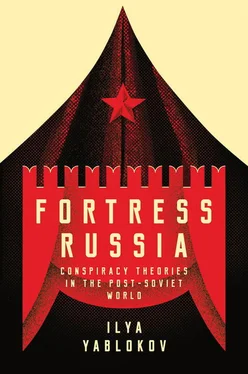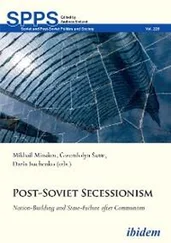Yet Russian public opinion, and the Russian media’s coverage of Gorbachev’s role in these events, is largely negative (Vanhala-Aniszewski and Siilin, 2013). This, in many ways, reinforces conspiracy allegations and makes Gorbachev a perfect scapegoat for the Soviet collapse. Many Russians have a negative attitude towards him, accusing him of political weakness and of turning a blind eye to the erosion of the country in the late 1980s. According to an opinion poll taken in 2001, Gorbachev was seen as the main cause of the Soviet Union’s collapse. The two most common reasons given for the break-up of the country were that it was a result of the disorder created by perestroika (55 per cent), and the conflict between Gorbachev and Yeltsin (28 per cent) (Dubin, 2011). Another poll conducted in 2016 by the Levada-Centre found that 67 per cent of respondents had negative attitudes towards the last Soviet ruler (Aleksandrov, 2016).
Forgeries as Main Argument
Claims about Gorbachev’s involvement in the ‘Western plan’ to destroy the Soviet Union rest on several documents that supposedly provide evidence of an anti-Russian plot. The first thing that puzzles some conspiracy theorists is how Iurii Andropov, one of the most powerful men in the Soviet Union – ex-chief of the KGB and leader of the country following Brezhnev’s death – could promote a person whose policies would cause the dissolution of the Soviet state a few years later. Since Andropov did indeed support Gorbachev (Brown, 1996; Galeotti, 1997), some Russian nationalist writers contended that Andropov himself was one of those ‘agents of influence’ who destroyed the Soviet Union:
All these human rights campaigners, ‘antisovetchiks’, are an element in the ‘Golgotha’ plan. This is exactly the legion that will control the minds of the befuddled masses in the period of global perestroika. Andropov was intimately acquainted with the fact that in Russia martyrs are loved and trusted. The first democratic elections proved the accuracy of Andropov’s plan, elaborated [together] with the CIA and Mossad. (Perin, 2001)
The author of this source refers to one of the conspiratorial forgeries which were popular in the 1990s and whose origins are to be found in the spoof novel ‘ Operatsiia Golgofa’: sekretnyi plan perestroiki ( ‘Operation Golgotha’: The Secret Plan of Perestroika ), written by Mikhail Liubimov (1995), himself a Soviet spy. The story shows a dying Andropov hatching a plan to plunge the Soviet Union into political chaos and ‘wild capitalism’ to renew Russian society without the need for mass purges. The plan describes perestroika , the August coup and Yeltsin’s reforms in such detail that the novel triggered a parliamentary investigation into whether it was actually authentic (Sid, 2004). Although law-enforcement agencies repudiated the claims made in the novel, it still resulted in conspiracy theories becoming part of popular culture. In November 2012, an article about Andropov’s planned reforms was the main feature of the magazine Russkii Reporter . Based on mostly anonymous interviews with former officers of the KGB, the author claimed that Putin’s own reforms could be seen as a follow-up to Andropov’s plan and its successful results (Kartsev, 2012).
The most important and influential forgery about the Soviet collapse is the so-called Plan Dallesa ( The Dulles Plan ), which purports to be a US National Security Council directive about a strategy to bring about the moral and cultural corruption of the Soviet people. The informal style of the text and some bits that have been copied from the Soviet spy novels makes it unlikely to have been an official governmental document (Deich, 2005):
People’s brains and consciousness are subject to change. By disseminating chaos there we shall surreptitiously replace their values with fake ones and we shall force them to believe in these values. How? We shall find like-minded persons in Russia… Impudence and insolence, lies and deception, drunkenness and drug dependence, bodily fear of each other and barefacedness, treachery, nationalism and national conflicts, pre-eminent hostility and anger towards the Russian people – all this we shall cunningly foster. (Dalles, n.d.)
The Dulles Plan places the conspiracy conceptualization of the Soviet collapse within a particular time-frame. Post-Soviet Russia’s socio-economic, interethnic and cultural problems are traced back to the past and connected with the Western plan for destruction. In contrast to Andropov’s plan, the aim of which was to reform the stagnating Soviet Union, the Dulles Plan saw the destruction of the USSR as the ultimate goal of the US political elites. Like the conspiratorial notion of ‘agents of influence’ which is popular among ex-KGB officers, the Dulles Plan has been taken up by former intelligence service employees who treat it as a springboard for various subversive operations (Khlobystov, n.d.). As Julia Fedor (2011) writes, the notion that the West destroyed the once great Soviet Union by means of moral corruption and brainwashing is an ideal reason to denounce it as a diabolical enemy. To a certain extent, the logic of the Cold War was shaped by the possibility of mutual nuclear destruction and the two camps had various projects planning how to destroy its ideological contender (Gaddis, 2005; Young, 2007). However, the supposed plans by US intelligence to defeat the USSR, which can be found in various Cold War sources, are too confusing to serve as genuine narratives of conspiracy theories. In addition, they constantly emphasize the moral superiority of the USA as the country of freedom and democracy, and this works against the image of the Soviet Union as an innocent victim of the West’s plans (Fedor, 2011, p. 849).
The Dulles Plan held a popular position in post-Soviet Russian culture and is often cited by film directors, actors and politicians. In 2012 NTV released a four-episode ‘mockumentary’ called ‘Russia: The Full Eclipse’, which explored various conspiracy theories popular in Russia today. One of these was that the Russian spies arrested in the USA in 2010 had discovered evidence that the Dulles Plan existed and passed it on to Russian journalists (Constantine26rus, 2012). The Dulles Plan framed each episode and was discussed by famous actors and presenters, who, according to the filmmakers, sincerely believed in the existence of this plan (Afanas’eva et al., 2012). Moreover, the film’s author, Andrei Loshak, admitted that rating of the film was high and the channel’s management praised his work (Malkina, 2012). However, it is not clear whether the audience treated the film as a mockery or as another conspiracy theory (Staryi televizor, 2012).
Belief in the Dulles Plan is not limited to celebrities and often is mentioned by mainstream politicians. Andrei Savel’ev, former MP and leader of the Great Russia party, stated: ‘There are few people who doubt the authenticity of this text [ The Dulles Plan ], because it utterly and completely reflects both the policy of the US towards the USSR and the achieved results of this policy – the breakdown of selfawareness of our people and the destruction of our country’ (Savel’ev, 2007). Nikolai Merkushkin, the then governor of Samara region, reiterated Savel’ev’s view in 2016 and accused Russian opposition leader Aleksei Navalny of fulfilling the aims of the Dulles Plan . Navalny, according to the ex-governor, brainwashes people and creates chaos in the country, and this will help the USA to destroy Russia and divide it into 32 puppet states (Nastoiashchee vremia, 2016). Savel’ev and Merkushkin, then, prominent politicians, use this proven forgery in an argument to delegitimize the positions of pro-Western proponents.
Читать дальше
Конец ознакомительного отрывка
Купить книгу












